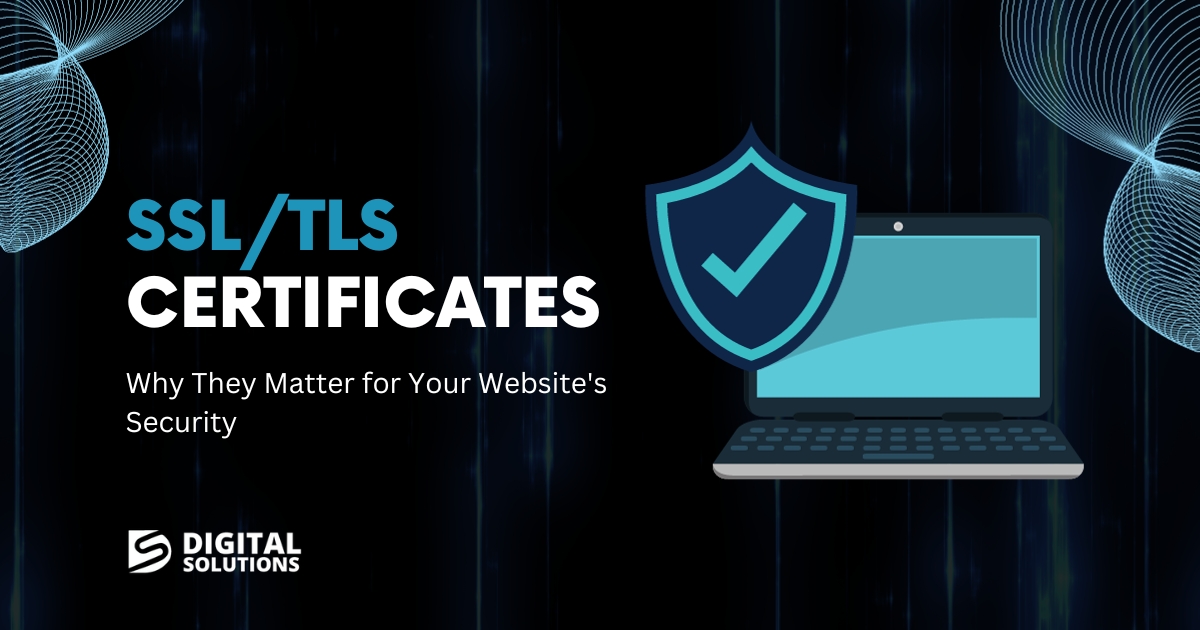- Oct 04, 2023
- 9 Comments

In today’s digital world, website security is more crucial than ever. Customers need to know their data is safe when visiting sites and making online transactions. One of the best ways to reassure visitors and establish credibility is by using SSL/TLS certificates importance on your website. But what exactly are these certificates, and why are they so important for security and user trust? This comprehensive guide explains it all.
What is an SSL/TLS Certificate?
SSL stands for Secure Sockets Layer and TLS stands for Transport Layer Security. These are protocols that encrypt data sent between a web browser or application and a server. An SSL/TLS certificate enables this encrypted connection, often represented by “HTTPS” in a website URL.
Specifically, SSL/TLS certificates perform two key functions:
- Authentication – The certificates validate that your website is owned by your organization. They confirm you are who you say you are.
- Encryption – Certificates encrypt data exchanged between devices and servers. This prevents hacking and eavesdropping.
Public and private key cryptography makes SSL/TLS possible. Certificates contain unique digital signatures tied to your domain. This allows for secure, authenticated connections.
Why Website Security Matters
SSL/TLS certificates importance is not just nominal extras. Proper security is a must for any professional website, for several reasons:
Loss of Customer Trust
Your visitors need to know they can safely browse and shop on your site without getting hacked. Just one security breach can mean losing hard-won customer trust.
Compliance Requirements
Industry regulations often mandate baseline security standards. For example, PCI DSS requires SSL for sites handling credit cards. Certificates help meet compliance.
Data Protection
From customer emails to payment info, your website likely handles sensitive data. Encryption is vital to prevent compromised customer privacy.
Ranking Boost
Google and other search engines emphasize site security in rankings. SSL/TLS certificates help improve your SEO through boosting credibility.
Types of SSL/TLS Certificates
All SSL/TLS certificates validate and encrypt to varying degrees, but some offer enhanced identity confirmation. Different types include:
Domain Validation (DV)
DV certificates just verify domain ownership. They’re fast, affordable options for base encryption.
Organization Validation (OV)
OV certificates confirm the registering organization’s identity through business documentation. More reputable than DV.
Extended Validation (EV)
EV certificates represent the highest standard. They validate an organization’s legal, physical and operational existence for maximum user trust.
Wildcard Certificates
Wildcards secure unlimited subdomains of a main domain. Useful for managing multiple sites under one account.
Shared Certificates
Shared or multi-domain certificates secure multiple domains and improve user trust online under a single certificate. Cost-effective for managing many sites.
Benefits of SSL/TLS Certificates
Installing SSL/TLS certificates on your website delivers major advantages:
Bolstered Trust and Credibility
Certificates boost visitor confidence by validating your identity and securing connections. This establishes legitimacy.
Improved Google Rankings
Google favors sites using HTTPS encryption with SSL/TLS. Certificates help improve SEO and search visibility.
PCI DSS Compliance
If you process credit cards online, SSL/TLS certificates are mandatory for PCI compliance. Maintain certification with proper security.
Secure Transactions
Encrypting customer data and financial transactions with SSL/TLS protects sensitive info being exchanged.
Malware Protection
Encrypted sites better resist phishing and malware attacks that can steal customer data. Certificates add a key layer of defense.
Best Practices for Implementation
Follow these tips to effectively implement SSL/TLS certificates on your website:
– Install certificates on all site pages, not just payment pages. Encrypt everything!
– Pick trusted certificate authorities like Comodo, DigiCert, GeoTrust for reliable validation.
– Redirect all HTTP traffic to HTTPS to prevent unsecure connections.
– Use HTTP Strict Transport Security (HSTS) to enforce HTTPS-only access.
– Set a “secure” cookie attribute to keep cookies encrypted.
– Enable OCSP stapling for faster certificate validation.
Maintaining Your Certificates
SSL/TLS certificates must be renewed on a regular basis to avoid expiring. Track renewal dates and set reminders to remain continuously protected. Also monitor for security updates and patch any vulnerabilities promptly.
In addition, reissue and replace certificates immediately if your private key is ever compromised. Key exposure can render certificates entirely ineffective.
Choosing the Right Certificate
All websites need basic domain validation at minimum. But consider these factors when selecting your ideal certificate:
– Type of site (e-commerce, informational etc) and data handled
– Visitor expectations and trust requirements
– Compliance needs and industry standards
– Future growth plans for new domains or subdomains
– Available budget weighed against value provided
Work with your hosting provider to pick the perfect certificate for your goals. As your site evolves, reassess to confirm your protection keeps pace.
Migrating from HTTP to HTTPS
Transitioning from HTTP to secure HTTPS requires planning and care. Here are some key steps when migrating:
– Obtain your SSL/TLS certificate from a trusted authority
– Install the certificates on your web server
– Update site pages and links to use HTTPS vs HTTP
– Redirect all HTTP traffic to HTTPS in your server configuration
– Update sitemaps and index listings for search engines
– Install HSTS header for added security
– Test extensively before launch
A smooth migration avoids any disruption in security or user experience.
Securing Customer Trust Online
In the digital world, failing to secure customer data on your website is unacceptable. SSL/TLS certificates are a fundamental tool for encrypting connections, validating your identity, and building user trust. By understanding the options and proper implementation strategies, you can leverage certificates to take your website security to the next level.
The importance of SSL/TLS certificates for safeguarding online transactions and interactions cannot be overstated. As cyber threats and regulations evolve, encryption and identity verification only become more crucial. Investing in robust certificates demonstrates your commitment to your customers’ security and privacy when visiting your website. That commitment pays dividends in long-term visitor confidence, loyalty and ultimately your business success.

Muhammad Athar Rasool, CEO of DS Technologies (Pvt.) LTD, regularly shares his expertise on web development, design, and security, along with insights on IoT and emerging trends. A keen writer, he often expresses his interests, concerns, and opinions on these topics, providing valuable content for those navigating the digital landscape.